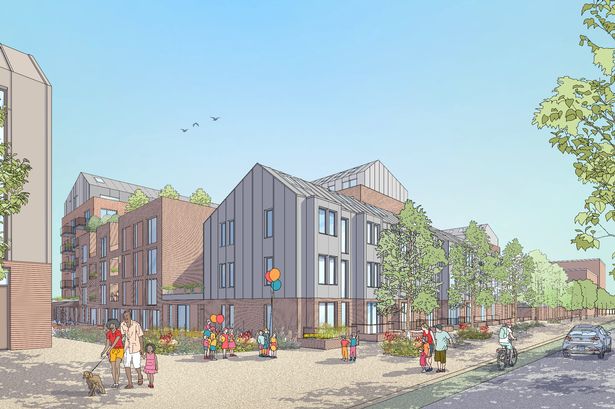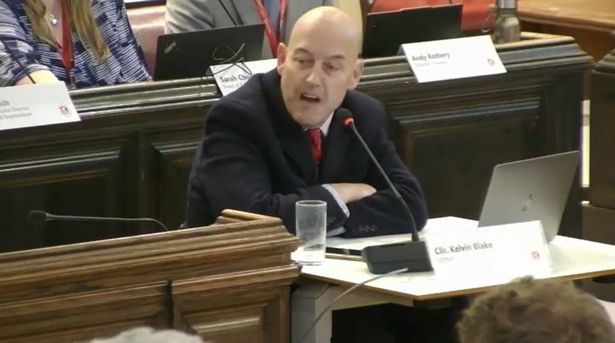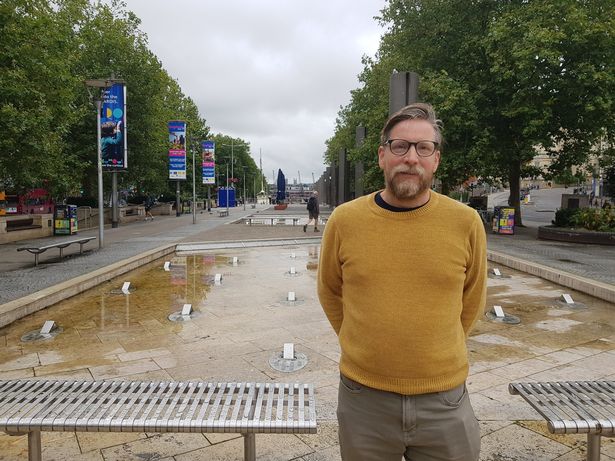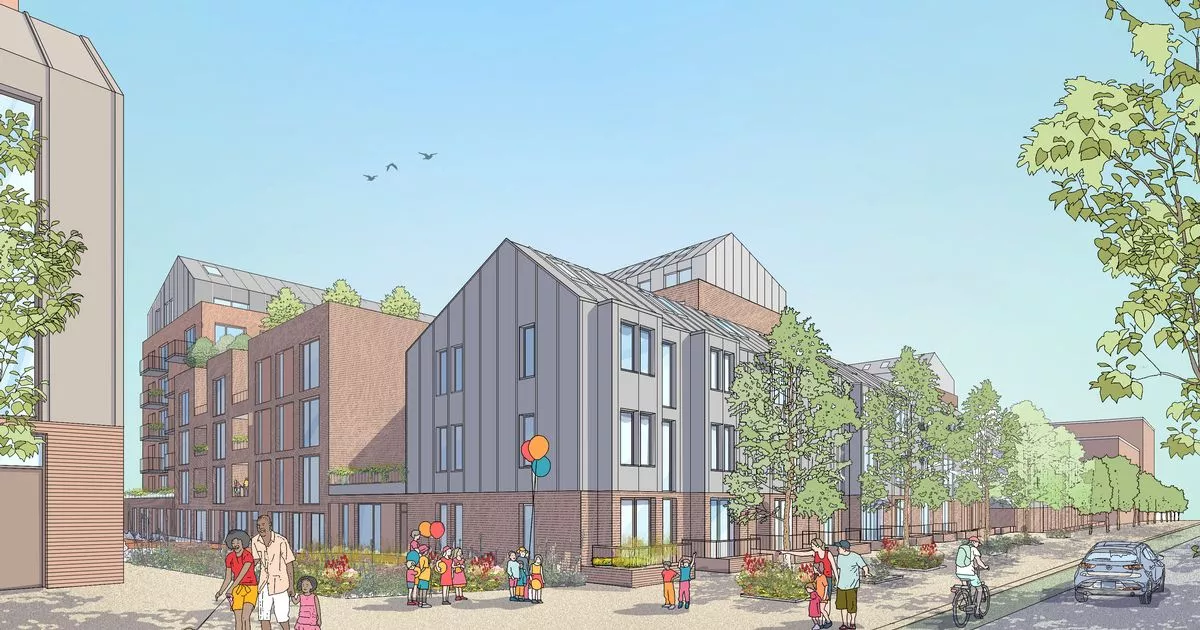“I cannot tell you how concerned GPs are about the impact additional residents will have” Plans have been unveiled
Plans have been unveiled
Doctors’ surgeries and health centres in east Bristol won’t be able to cope with a huge development of 2,000 new homes unless council planners agree to share some of the millions of pounds of community contributions from the developers.
That’s the view of NHS chiefs and local councillors who say they are ‘extremely concerned’ that Bristol City Council ’s planning department has again been refusing to share the Community Infrastructure Levy (CIL), the money developers pay to the council to help pay for new facilities needed alongside major developments.
Three major applications are expected to see a total of 2,235 new homes built in what the council is calling the ‘Central Fishponds Regeneration Area’, the huge former industrial estate and factory site between Fishponds and Hillfields.
Bristol Live can reveal that NHS bosses have told council planners in a series of letters that they will need a total of £3.2 million taken as a share of the Community Infrastructure Levy, to fund a new health centre, if all three developments go ahead.
So far, the council has not yet agreed, and now one local councillor said GP surgeries are concerned there will be thousands of new residents of Fishponds moving to the new developments in the next few years when the existing surgeries are already over-capacity. Bristol City Council’s man in charge of the economy committee said the council was working on a city-wide strategy with the NHS, on how to plan expansion of healthcare alongside housing development.
The issue in Fishponds mirrors a similar one in Totterdown, Temple Meads and Bedminster, where the NHS has asked for a total of almost £2 million of CIL money from the council linked to four major developments of flats and student accommodation in the past year or so. Two of the four requests have been turned down, the other two are still awaiting a decision.
Earlier this month, Bristol Live revealed the ongoing issue between the NHS’s strategic planners and City Hall planning officers, which has seen requests for a share of CIL money to help the NHS create new primary health care provision refused for a variety of reasons by the city council.
The same debate is happening on a slightly bigger scale with the Central Fishponds regeneration area. There are three sites being developed. The first and smallest, on the site of the former Graphic Packaging International factory. Planning permission has already been granted for 255 homes there, but council officers turned down an NHS request for £368,249 from the Community Infrastructure Levy to increase GP capacity in the area.
READ MORE: NHS asks for £2 million from planners for more doctors in Bristol’s housing boomREAD MORE: Plans for new East Bristol neighbourhood with shops, 1,600 homes and wildlife areas
A pre-application has been submitted for 380 new homes on the site of Fishponds Ltd, with NHS bosses asking for £544,073 from the council’s CIL pot, and no decision has been made yet.
But the biggest plan will see the land to the north of Goodneston Road being developed with 1,600 new homes. Although there is no formal planning application for this yet, the NHS bosses have already told council planners they would need £2,290,834 to put towards the creation of a new health centre.
NHS bosses have been in discussions with the developers of the Goodneston Road site about whether an area within that development could be allocated for that new health centre, but no decisions have yet been made within the NHS about whether it would be better to increase GP capacity with a new health centre there or somewhere else.
Local councillor Kelvin Blake (Lab, Hillfields) said he’d been told by council planning officers that all three requests for money would be refused, and doctors in the area are getting increasingly worried the council planners will again turn down the requests for CIL money from the NHS, as they already have done with the first development site.
 Cllr Kelvin Blake (Lab, Hillfields)(Image: Bristol City Council/YouTube)
Cllr Kelvin Blake (Lab, Hillfields)(Image: Bristol City Council/YouTube)
“The two major issues that residents raise are the impact on existing GP practices and the impact on the road network and parking,” Cllr Blake said, in a letter to council leader Cllr Tony Dyer (Green, Southville).
“I met with representatives of all of GP practices in the area recently and I cannot tell you how concerned they are about the impact additional residents will have on their services especially as they are over subscribed now.
“I have various communications with planning officers and they indicate to me that the above ask from the NHS will not be met. This is seemingly in line with Bristol’s misguided approach to NHS provision.
“So, please can you assure me that we will not miss this opportunity to deliver much needed NHS GP services for Fishponds. Please don’t say this is just a planning issue. This is a strategic development issue across the whole of Bristol and it’s about what we prioritise as important,” he added.
Letters sent by NHS Property Services to Bristol City Council earlier this year, seen by Bristol Live, indicate that even if all four of the area’s GP surgeries were to hire more doctors and nurses to cope with the thousands of new residents, they do not have the floorspace required to house those extra doctors and nurses.
The Fireclay Health surgery and the Old School Surgery are already both over capacity by 78 per cent, The Fishponds Family Practice is 53 per cent over capacity and the Beechwood Medical Practice is 55 per cent over capacity.
 Fishponds Family Care Centre(Image: Google Maps)
Fishponds Family Care Centre(Image: Google Maps)
In a series of letters from the Head of Strategic Estates at the NHS Integrated Care Board and a town planner with NHS Property Services, the council is warned it would be breaching its own planning policy if they gave the go-ahead to these huge housing developments without sharing the CIL contribution with the NHS.
“There is not sufficient existing capacity locally to accommodate the population growth generated by the proposed development,” they warn. “Mitigation is therefore required in the form of a financial contribution towards the capital cost of delivering the additional primary care floorspace required to serve residents of the new development.
“Without this mitigation, the development would not comply with Local Plan Policies,” they added.
The issue of funding NHS services from money developers give to the city council has been a hot topic for many years, particularly in South Bristol. In 2022, the now-leader of the council, Cllr Tony Dyer called on the then Labour-run council to share much of the expected £8 million of CIL money from the Bedminster Green development with the NHS because the main doctors’ surgery in Bedminster is so short of space that patients are being sent across the river to the city centre to see their GP.
READ MORE: Scaled-back plans to demolish two offices and build 380 homesREAD MORE: Plans approved for 250 homes on former Bristol factory site
That didn’t happen, and at the end of 2023, the then-ruling Labour administration proposed a ‘Golden Motion’ which called on the NHS to keep up with Bristol’s home-building boom by properly funding its own expansion to match the demand from thousands of new residents. Throughout 2024 in Temple Quarter, Bedminster and Ashton Gate, and now in Fishponds, council planning officers have continued to follow that policy – of refusing NHS requests for CIL money.
Now, in Hillfields and Fishponds, it is a local Labour councillor who is calling on the now Green Party-led administration to help the NHS pay for new healthcare facilities.
Cllr Andrew Brown (Lib Dem, Hengrove and Whitchurch Park) is the chair of the council’s economy and skills committee. He said: “As our city grows so too does the need to plan for new homes and the infrastructure needed to support that growth including how much is needed, where it is needed, how it can be funded and when it can be delivered.
 Lib Dem Cllr Andrew Brown(Image: Alex Seabrook )
Lib Dem Cllr Andrew Brown(Image: Alex Seabrook )
“Our teams are meeting regularly with the Estates team at Bristol, North Somerset, and South Gloucestershire Integrated Care Board to review and model the health infrastructure needs including the capacity of existing surgeries in the city.
New or extended facilities come at a cost and development does and will continue to contribute land, space, and funds to support delivery. This is in addition to contributions towards improved streets, community spaces and affordable homes,” he added.
“Whilst it is not uncommon for the ICB to identify potential infrastructure levy contributions associated with delivering health infrastructure as part of individual major planning applications, it remains the case that what is needed right now is a citywide investment plan that considers all big developments and the sums already identified through the planning process.
“We are looking forward to continuing our work with colleagues in the ICB to plan for growth in a methodical way, mapping out the investment needed and where that funding can be sourced. We intend to bring further updates on this work to our Economy and Skills Policy Committee later this year to ensure a public discussion about need and possible solutions can be had,” he added.
